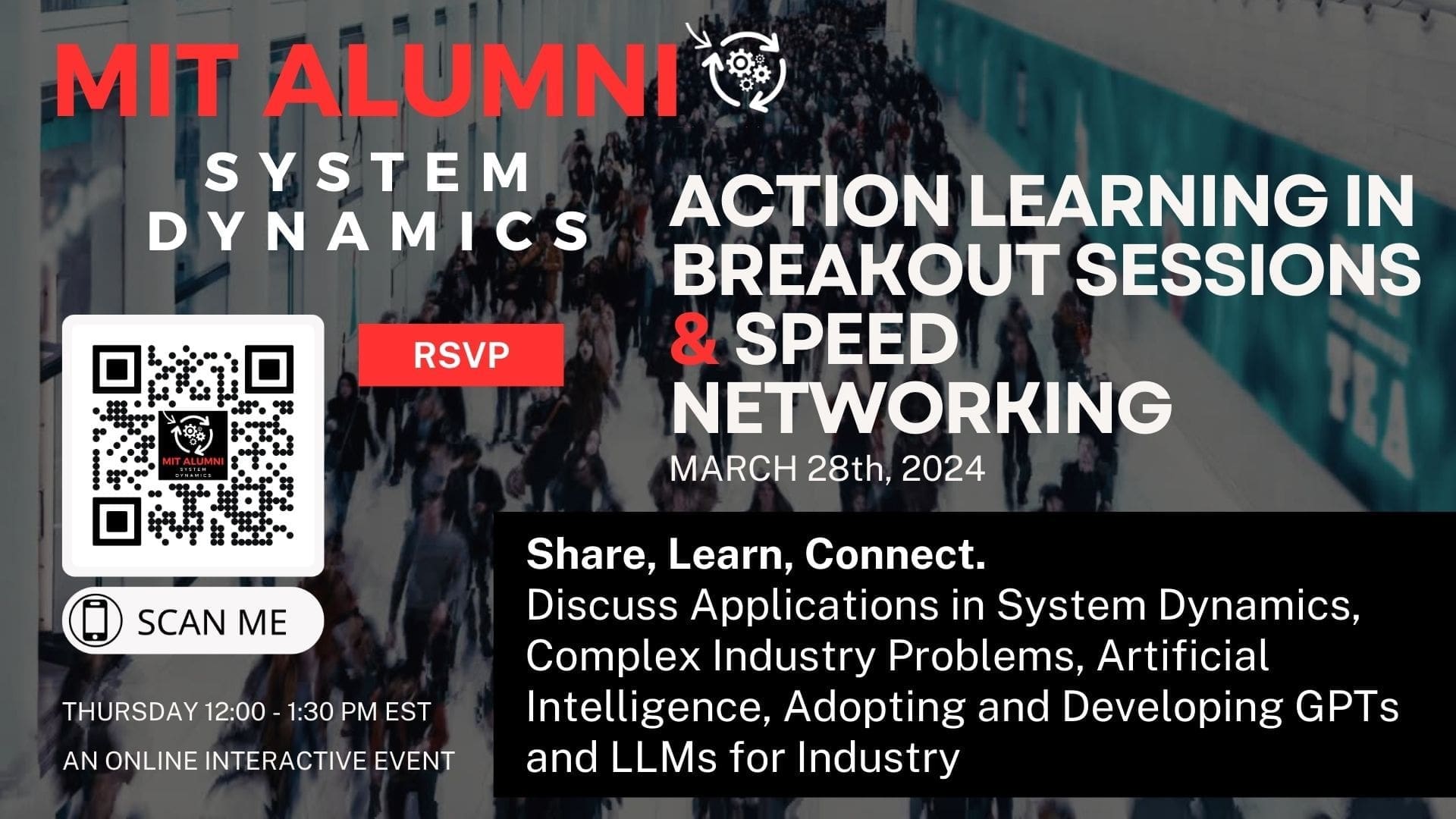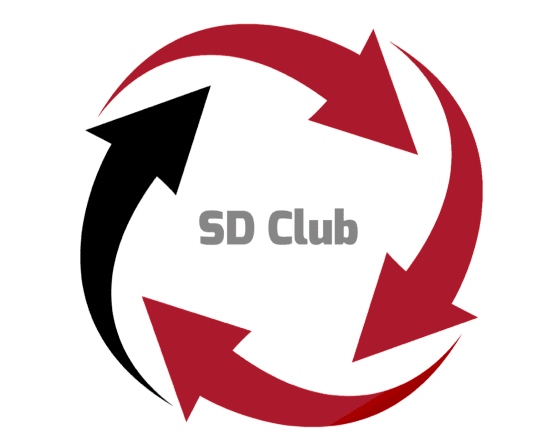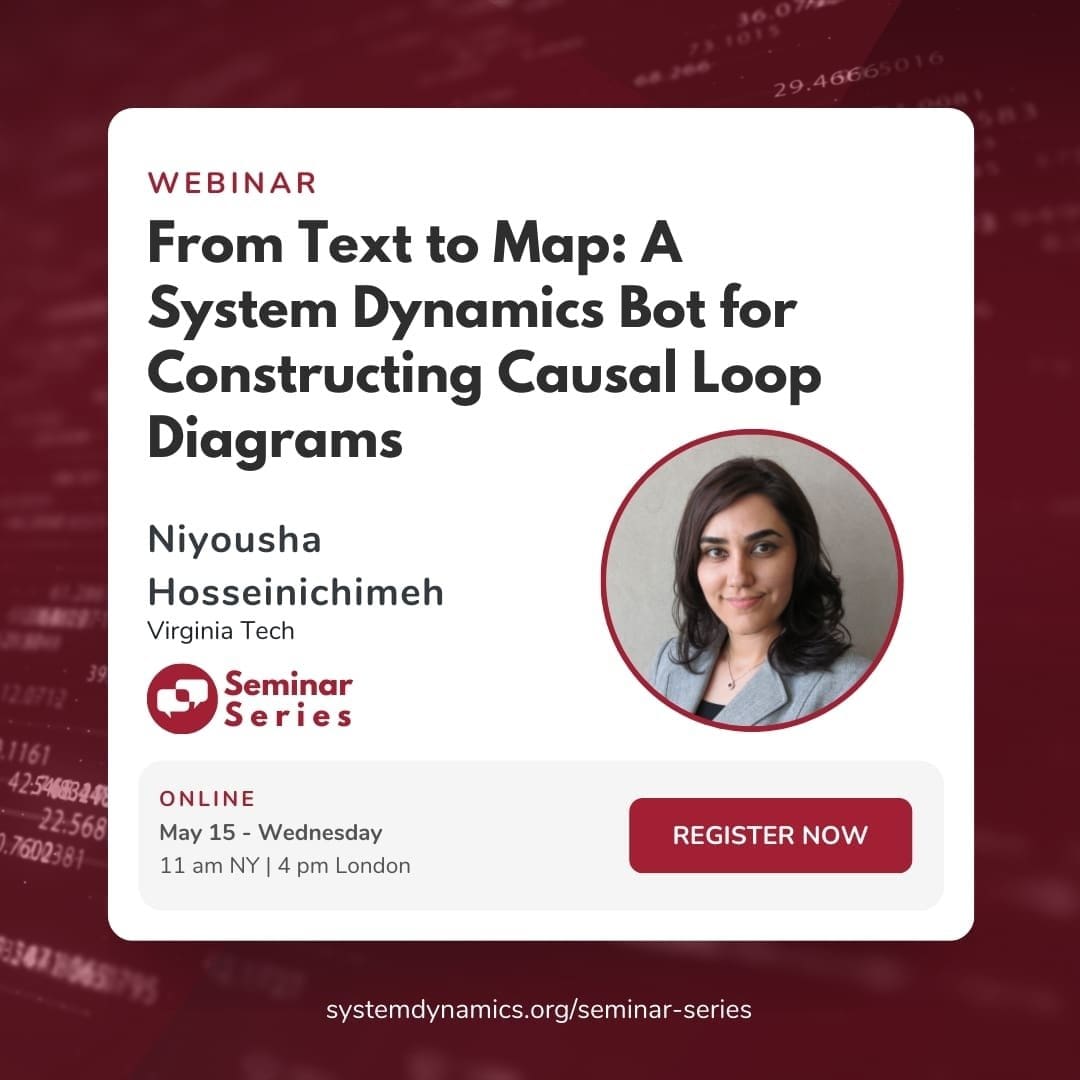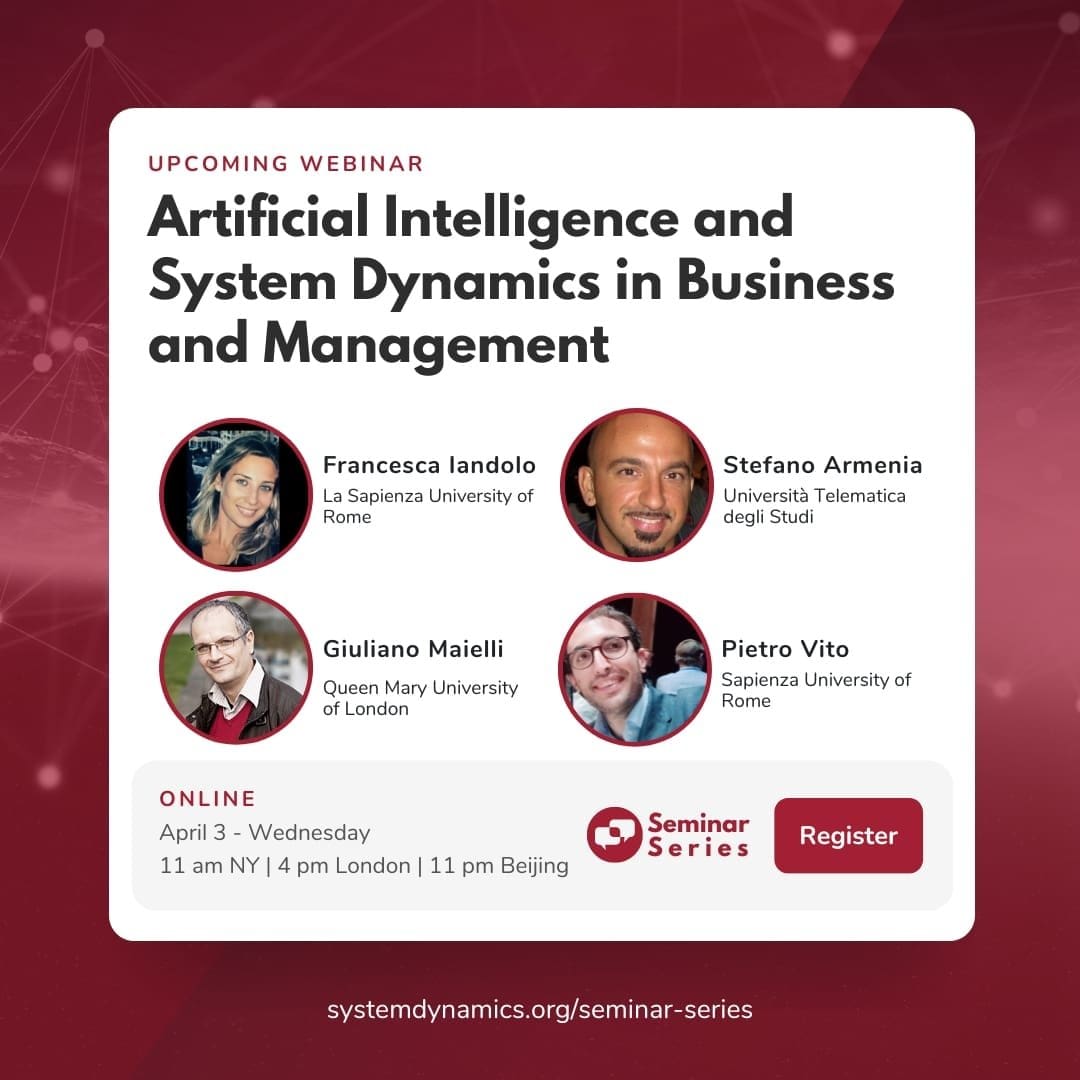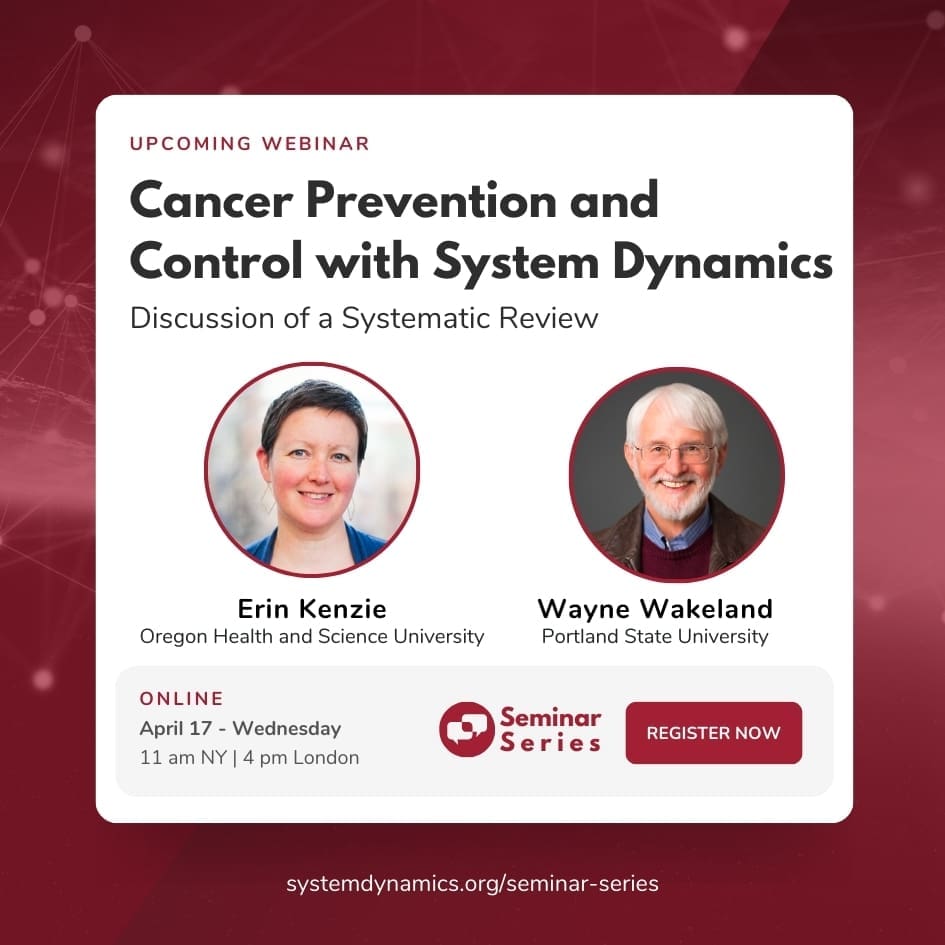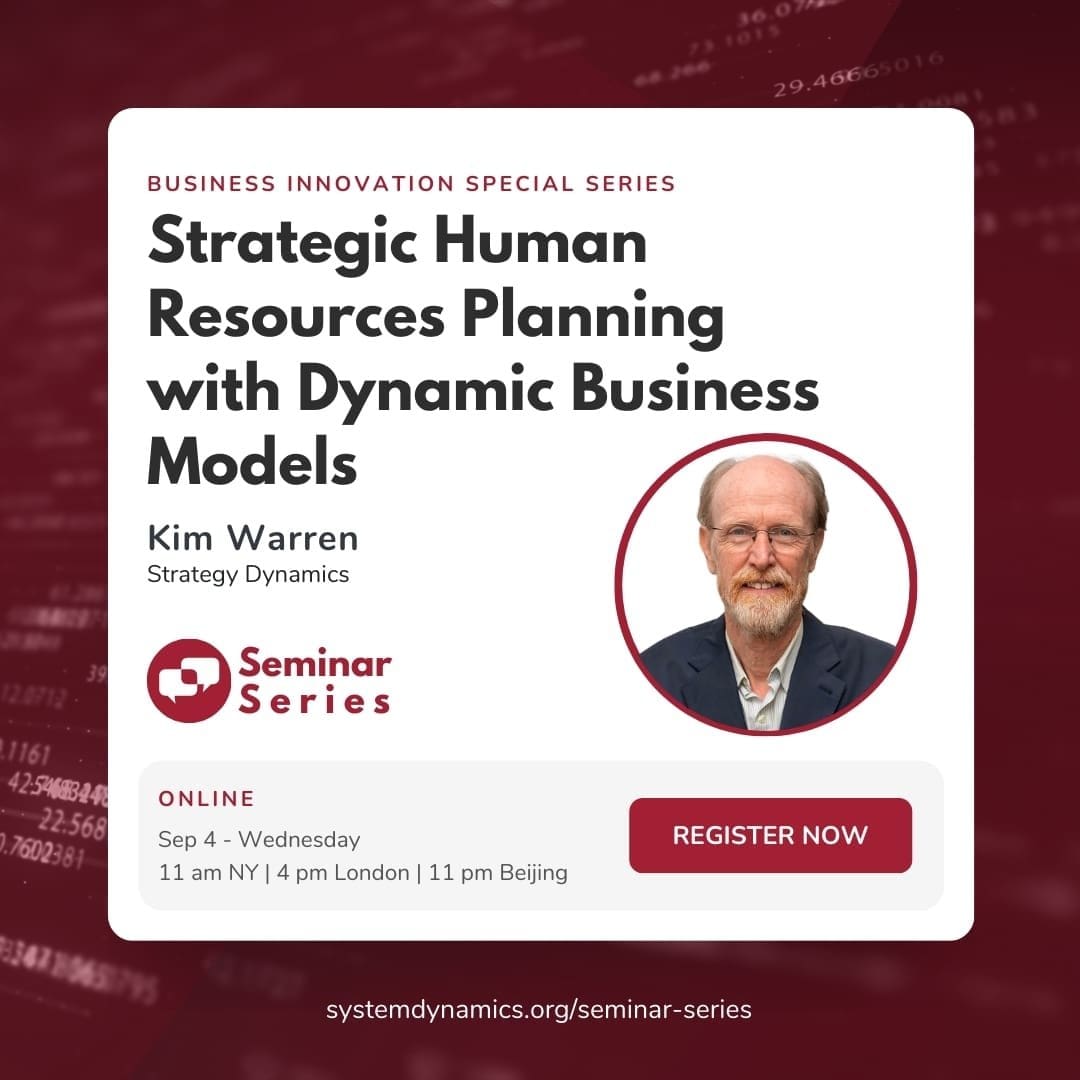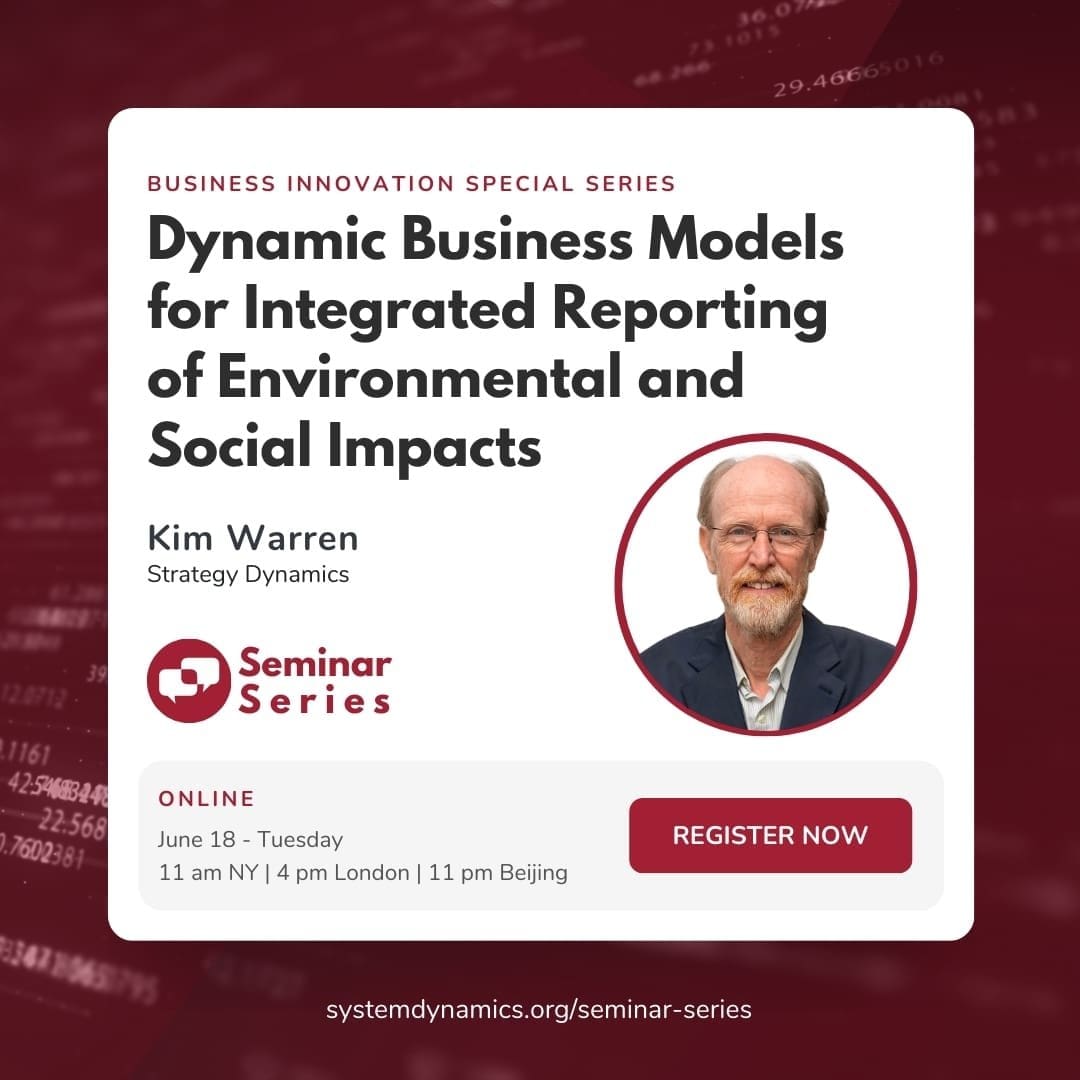MIT Alumni System Dynamics: Action Learning in Breakout Sessions & Speed Networking
In this two-part online interactive event, spend the first half exploring topics and open discussions in short breakout sessions led by breakout leaders and room participants on system dynamics, real-world applications, and the adoption of artificial intelligence, including GPTs and LLMS. Each topic will be rotated every 10 minutes. The remaining session will become an interactive automated speed networking breakout.
We encourage you to participate, share, and ask questions. All experiences are welcome, and you don’t need to be an experienced System Dynamics practitioner or academic.
To register, RSVP, or learn more, visit the event page: https://www.masd-events.xyz/
Ivan Taylor on “Building System Dynamics Models in Microsoft Excel”
Please join us online Friday, March 29th 11AM ET (Boston time. Here is a time converter).
In this Collective Learning Meeting (CLM), WPI System Dynamics will host Dr. Ivan Taylor (ivan@policydynamics.ca) who will present
Building System Dynamics Models in Microsoft Excel
Short Description: Discover the step-by-step process of creating System Dynamics models using Microsoft Excel. Learn how to apply Excel to accurately represent real-world systems using System Dynamics models.
Biography: Ivan Taylor worked as a Defence Scientist in the Centre for Operational Research in Defence Research and Development Canada for over 33 years. He is President and Senior Researcher at Policy Dynamics Inc., established in 2001 (www.policydynamics.ca). He is a member of the System Dynamics Society since 1997 where he is a one-on-one mentor to young people Worldwide. He is also a member of the Canadian Operational Research Society and the International Council on Systems Engineering (INCOSE). He is the Director of Membership of INCOSE Canada. He has a PhD in Public Policy and an MSc in Information and Systems Science from Carleton University in Ottawa. He recently worked with the US Army to develop policies to reduce soldier suicides and is currently working with a construction company in Southern Ontario on Indigenous Engagement and Inclusion. There is more information on his LinkedIn page https://www.linkedin.com/in/ivantaylor/.
Question for the Audience
Would the use of Excel to implement System Dynamics models help you communicate with laypeople?
We will record this session and post it on the WPI SD Club YouTube channel for the public.
If you are interested in presenting your work in a future CLM, please contact Christine Tang (ctang@wpi.edu).
Call-in details: https://bit.ly/CLM-2024-03-29
From Text to Map: A System Dynamics Bot for Constructing Causal Loop Diagrams
May, 15 at 11 am NY | 4 pm London | 11 pm Beijing | Time Converter
From Text to Map: A System Dynamics Bot for Constructing Causal Loop Diagrams
Join us to delve into the innovative System Dynamics Bot, a tool designed to automate causal loop diagram creation from text. Learn how it performs in converting text to maps, see practical examples, and understand the challenges and solutions in its development.
Learning Outcomes:
- Gain insight into the capabilities of large language models in system dynamics and model building.
- Understand the effectiveness of the System Dynamics Bot in identifying key relationships within textual data.
- Discover the challenges encountered and solutions implemented during the development of this tool.
This webinar is ideal for system dynamics practitioners, data analysts, and anyone interested in the intersection of artificial intelligence and model building. Sign up to explore how this technology can streamline your modeling processes and enhance your understanding of complex systems.
About the Presenters
Niyousha Hosseinichimeh has a PhD and a master’s degree in public administration and policy from State University of New York at Albany, and a bachelor’s degree in mechanical engineering from Sharif University, Iran. She is currently an assistant professor at the Department of Industrial and Systems Engineering at Virginia Tech. Her research focuses on developing and applying methods to improve health and healthcare systems. She uses simulation models to help stakeholders improve their understanding and decision making in complex dynamic systems. She has applied system dynamics approach to diverse health issues including infant mortality, mental health, and alcohol impaired driving among teens. Her methodological contributions include expanding calibration methods for dynamic models and developing techniques for system dynamics group model building. Her research has been funded by the National Institute of Health, National Science Foundation, Agency for Healthcare Research and Quality, Ohio State Department of Health, and Burroughs Wellcome Fund.
Artificial Intelligence and System Dynamics in Business and Management
April 3 at 11 am NY | 4 pm London | 11 pm Beijing | Time Converter
This webinar presents the dynamic interplay between Artificial Intelligence (AI) and System Dynamics (SD) in business and management. As AI’s role in solving complex challenges and redefining system interactions grows, it becomes imperative to examine its synergistic relationship with System Dynamics.
This session unveils the results of a thorough literature review, employing integrated bibliometric and topic modeling techniques to probe the extent and nature of AI and SD’s convergence in business and management. Our study focused on a pivotal research question: “To what extent and in which direction is the literature on Artificial Intelligence (AI) and System Dynamics (SD) converging within the business and management landscape?”
Highlights of our findings:
- In-depth bibliometric analysis: uncovered the intersections of academic discussions on System Dynamics and AI, charting the evolution and patterns of their convergence.
- Advanced topic modeling discoveries: delved into the intricacies of AI and System Dynamics integration, as revealed by cutting-edge topic modeling, offering a granular view of this convergence.
- Dual convergence pathways: assessed the nuances of “soft convergence,” where AI enhances System Dynamics with a focus on social dynamics, against the backdrop of “hard convergence,” where AI is a catalyst in reengineering system design and interdependencies.
- Emerging trends and strategic implications: presented a reflection on why soft convergence currently dominates the business landscape and how hard convergence could emerge as a groundbreaking approach in System Dynamics research and application.
The webinar welcomes scholars, researchers, and industry practitioners. This session seeks to provide insights and forward-thinking perspectives on the intersection of these two fields.
About the Presenters
Francesca Iandolo, PhD, is a Tenure-track Assistant Professor in Management at Sapienza University of Rome. She graduated with her master’s degree in accounting with honours and holds a PhD in Management with a dissertation thesis on Viable Systems Approach (vSa), value creation, and sustainability. Her research interests concern the application of systems theories to corporate sustainability and the role of technology diffusion within digital platforms. Francesca serves as a Representative of the Researchers in the Department Board of Management and the Faculty Board of the Faculty of Economics at Sapienza University of Rome. Additionally, she is the Academic Coordinator for Mobility at the Faculty of Economics, Sapienza University of Rome. She participated in several national and international conferences as a track proponent and chair and published in national and international journals. She is a chartered accountant and junior consultant for private companies.
Giuliano Maielli’s research spans the fields of business history and organization studies. His work focuses upon technological and organizational innovation through the analytical lens of “design hierarchies”, with a particular interest in path-dependence and path-creation as socio-organizational phenomena. Giuliano has published peer-reviewed academic papers on these topics, while his current research revolves around platform innovation dynamics, the internet of things and industry 4.0.
Stefano Armenia is a Tenure-track Lecturer (Ricercatore TDB) in Business Organizations and in the Analysis of Dynamical Systems at the Università Telematica degli Studi in Florence., where he teaches “Business Organizations” and “Marketing communication techniques”. He holds a degree in Computer Engineering, Industrial Automation & Control Systems, a Ph.D. in Business Engineering and a Master in Management and Business Administration. He is member of the System Dynamics International Society (SDS) since 2002, President of the System Dynamics Italian Chapter (SYDIC – the Italian Network of the SDS) since 2011 and member of the SDS Policy Council from 2014 to 2022, where he also acted as VP Chapters & SIGs. From 2014 to 2017 he has also been the IT & Communication Officer of the European Academy of Management. In 2021 he has obtained the national scientific status as associate professor in Business Organizations (ASN 2021, SSD: SECS-P/10, 3 out of 3 median indicators) His professional background includes extensive knowledge of main funding programs at national (Italian) and International level with a specific experience on research programs. Among his previous roles, he has acted as Bid Manager, Project Manager and Professional Consultant in several fields, both in the Public Administration and Industrial environments. In his research work, he deals with the analysis of complex systems dynamics in many fields: cybersecurity, critical infrastructure protection, logistics and sustainable transportation, finance, technological innovation, policy modelling and assessment of impacts of innovation and new technologies (Digital Transformation) on organizational processes and on society. From 2014 to 2020 he has been co-editor in chief of the Kybernetes Journal (Emerald-Insights) and currently is Associate or Guest editor in several other scientific journals in the field of system dynamics (IJASS, IJMABS). He is an author of several papers in top-ranked journals and has been involved in various initiatives dealing with sustainable development and Climate Change (he has led the Climate Action Exercise in several previous occasions, both at public and private level). He has been involved in different researches dealing with sustainable development and other environmental issues (i.e. Carbon Capture & Sequestration, Urban Sustainable Development, etc.) as well as with the translation of sustainability best sellers (i.e.: “Thinking in Systems” by Donella Meadows).
Pietro Vito, PhD in Management, is a researcher in Economics and Business Management at the Sapienza University of Rome. His research interests cover the methodological aspects of business management from a systemic and vital perspective, as well as thematic aspects related to sustainability, environmental protection, intellectual capital, and artificial intelligence.
Cancer Prevention and Control with System Dynamics
April 17 at 11 am NY | 4 pm London | 11 pm Beijing | Time Converter
Cancer Prevention and Control with System Dynamics – Discussion of a Systematic Review
Target Audience
Critical Resource-Development With Dynamic Business Models
October 16 at 11 am NY | 4 pm London | 11 pm Beijing | Time Converter
This seminar is part of our special series System Dynamics for Business Innovation with Kim Warren. A series of nine webinars offering a deep dive into the application of System dynamics in Business. The sessions will explore strategic modeling techniques and their transformative impact across different business domains, from strategic management to IT systems planning and environmental impact. This series will reveal the potential of System Dynamics as a powerful tool for business innovation and complex decision-making.
Session 9
Critical Resource-Development With Dynamic Business Models
About the Presenter
Kim Warren is an accomplished strategist with a wealth of experience in the business world. He spent 10 years in senior strategy roles, including as Retail Strategy Director at Whitbread PLC. Warren then transitioned to academia, teaching Strategic Management at London Business School for two decades. During his tenure, he developed a keen interest in System Dynamics, finding traditional strategy tools insufficient for modern business challenges. This led him to embrace and adapt System Dynamics, creating the Strategy Dynamics method. Warren’s method focuses on designing and managing business systems dynamically to adapt to changing markets and internal business conditions. He has authored influential books on the subject, including “Competitive Strategy Dynamics” and “Strategic Management Dynamics,” and has been recognized with the prestigious Jay Wright Forrester Award from the International System Dynamics Society, where he also served as president in 2013. Warren, along with his partner Christina Spencer, has developed a range of learning materials and courses to disseminate the Strategy Dynamics method, utilizing the Silico online modeling app to support this approach.
For more detailed information, you can visit his website here
Dynamic Business Models in Systems Engineering
September 25 at 11 am NY | 4 pm London | 11 pm Beijing | Time Converter
This seminar is part of our special series System Dynamics for Business Innovation with Kim Warren. A series of nine webinars offering a deep dive into the application of System dynamics in Business. Throughout the sessions, we’ll explore strategic modeling techniques and their transformative impact across different business domains, from strategic management to IT systems planning and sustainable practices. This series aims to reveal the potential of System Dynamics as a powerful tool for business innovation and complex decision-making.
Session 8
Dynamic Business Models in Systems Engineering
Certificate of Attendance
About the Presenter
Kim Warren is an accomplished strategist with a wealth of experience in the business world. He spent 10 years in senior strategy roles, including as Retail Strategy Director at Whitbread PLC. Warren then transitioned to academia, teaching Strategic Management at London Business School for two decades. During his tenure, he developed a keen interest in System Dynamics, finding traditional strategy tools insufficient for modern business challenges. This led him to embrace and adapt System Dynamics, creating the Strategy Dynamics method. Warren’s method focuses on designing and managing business systems dynamically to adapt to changing markets and internal business conditions. He has authored influential books on the subject, including “Competitive Strategy Dynamics” and “Strategic Management Dynamics,” and has been recognized with the prestigious Jay Wright Forrester Award from the International System Dynamics Society, where he also served as president in 2013. Warren, along with his partner Christina Spencer, has developed a range of learning materials and courses to disseminate the Strategy Dynamics method, utilizing the Silico online modeling app to support this approach.
For more detailed information, you can visit his website here.
Up Next
Strategic HR Planning with Dynamic Business Models
September 4 at 11 am NY | 4 pm London | 11 pm Beijing | Time Converter
This seminar is part of our special series System Dynamics for Business Innovation with Kim Warren. A series of nine webinars offering a deep dive into the application of System dynamics in Business. Throughout the sessions, we’ll explore strategic modeling techniques and their transformative impact across different business domains, from strategic management to IT systems planning and sustainable practices. This series aims to reveal the potential of System Dynamics as a powerful tool for business innovation and complex decision-making.
Session 7
Strategic Human Resources Planning with Dynamic Business Models
About the Presenter
Kim Warren is an accomplished strategist with a wealth of experience in the business world. He spent 10 years in senior strategy roles, including as Retail Strategy Director at Whitbread PLC. Warren then transitioned to academia, teaching Strategic Management at London Business School for two decades. During his tenure, he developed a keen interest in System Dynamics, finding traditional strategy tools insufficient for modern business challenges. This led him to embrace and adapt System Dynamics, creating the Strategy Dynamics method. Warren’s method focuses on designing and managing business systems dynamically to adapt to changing markets and internal business conditions. He has authored influential books on the subject, including “Competitive Strategy Dynamics” and “Strategic Management Dynamics,” and has been recognized with the prestigious Jay Wright Forrester Award from the International System Dynamics Society, where he also served as president in 2013. Warren, along with his partner Christina Spencer, has developed a range of learning materials and courses to disseminate the Strategy Dynamics method, utilizing the Silico online modeling app to support this approach.
For more detailed information, you can visit his website here.
Dynamic Business Models for Integrated Reporting of Environmental and Social impacts
June 18 at 11 am NY | 4 pm London | 11 pm Beijing | Time Converter
This seminar is part of our special series System Dynamics for Business Innovation with Kim Warren. A series of nine webinars offering a deep dive into the application of System dynamics in Business. Throughout the sessions, we’ll explore strategic modeling techniques and their transformative impact across different business domains, from strategic management to IT systems planning and sustainable practices. This series aims to reveal the potential of System Dynamics as a powerful tool for business innovation and complex decision-making.
Session 6
Dynamic Business Models for Integrated Reporting of Environmental and Social Impacts
About the Presenter
Kim Warren is an accomplished strategist with a wealth of experience in the business world. He spent 10 years in senior strategy roles, including as Retail Strategy Director at Whitbread PLC. Warren then transitioned to academia, teaching Strategic Management at London Business School for two decades. During his tenure, he developed a keen interest in System Dynamics, finding traditional strategy tools insufficient for modern business challenges. This led him to embrace and adapt System Dynamics, creating the Strategy Dynamics method. Warren’s method focuses on designing and managing business systems dynamically to adapt to changing markets and internal business conditions. He has authored influential books on the subject, including “Competitive Strategy Dynamics” and “Strategic Management Dynamics,” and has been recognized with the prestigious Jay Wright Forrester Award from the International System Dynamics Society, where he also served as president in 2013. Warren, along with his partner Christina Spencer, has developed a range of learning materials and courses to disseminate the Strategy Dynamics method, utilizing the Silico online modeling app to support this approach.
For more detailed information, you can visit his website here.
Harnessing Intangible Business Factors with Dynamic Business Models
May 22 at 11 am NY | 4 pm London | 11 pm Beijing | Time Converter
This seminar is part of our special series System Dynamics for Business Innovation with Kim Warren. A series of nine webinars offering a deep dive into the application of System dynamics in Business. The sessions will explore strategic modeling techniques and their transformative impact across different business domains, from strategic management to IT systems planning and environmental impact. This series will reveal the potential of System Dynamics as a powerful tool for business innovation and complex decision-making.
Session 4
Harnessing Intangible Business Factors with Dynamic Business Models
This webinar explores how intangible or ‘soft’ assets like reputation, skills, data and quality affect – and are affected by – the development of a business system and its performance. Participants will learn how dynamic business models (DBMs) can reliably specify, quantify and incorporate these often-overlooked elements into business-system models of any scope.
Learning Outcomes
- Understand the common types of intangible factors, and their role in business systems.
- Learn how intangibles can be specified, quantified and simulated as part of a DBM.
- See how strategies to leverage intangible assets for business growth and sustainability can be developed.
Target Audience:
- Business analysts, consultants, strategists and decision-makers.
- Professionals in marketing, HR, customer service, and product development.
- Organizational development specialists.
- Academics and students in business and management studies.
This webinar is designed for those seeking to deepen their understanding and practical application of DBMs in managing and leveraging intangible business factors.
Certificate of Attendance
About the Presenter
Kim Warren is an accomplished strategist with a wealth of experience in the business world. He spent 10 years in senior strategy roles, including as Retail Strategy Director at Whitbread PLC. Warren then transitioned to academia, teaching Strategic Management at London Business School for two decades. During his tenure, he developed a keen interest in System Dynamics, finding traditional strategy tools insufficient for modern business challenges. This led him to embrace and adapt System Dynamics, creating the Strategy Dynamics method. Warren’s method focuses on designing and managing business systems dynamically to adapt to changing markets and internal business conditions. He has authored influential books on the subject, including “Competitive Strategy Dynamics” and “Strategic Management Dynamics,” and has been recognized with the prestigious Jay Wright Forrester Award from the International System Dynamics Society, where he also served as president in 2013. Warren, along with his partner Christina Spencer, has developed a range of learning materials and courses to disseminate the Strategy Dynamics method, utilizing the Silico online modeling app to support this approach.
For more detailed information, you can visit his website here.

